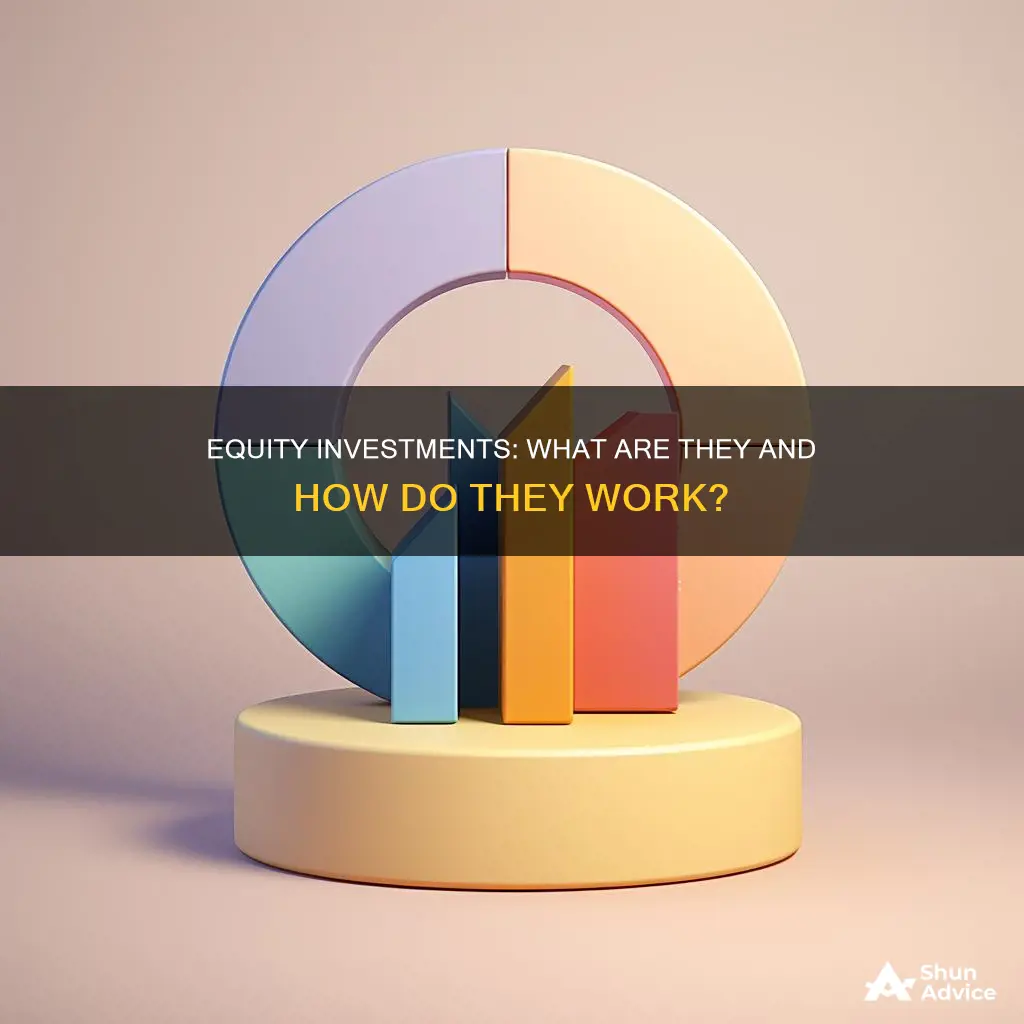
Equity investment is a traditional form of investment that involves investors putting money into private or public companies by purchasing shares. This enables investors to obtain a stake in companies, with the expectation that the value of their shares will increase over time. Equity investors receive money from shares that have increased in value when they sell them or if the company liquidates its assets and pays off its debts. Equity funds are a type of investment fund that pools money from investors to trade primarily a portfolio of stocks, also known as equity securities.
What You'll Learn

Equity investment types
Equity investment enables investors to obtain a stake in companies by purchasing shares. The return on investment can vary significantly depending on the company, sector and market, but equities remain a popular form of investment. There are several types of equity investment, each with distinct rewards and risks. Here are some of the main types:
- Common stock: Also known as equity shares, common stock represents ownership in a company and entitles the shareholder to vote on important company decisions and receive a portion of the company's profits in the form of dividends. Common stockholders can also benefit from capital appreciation if the company's stock price increases.
- Preferred stock: Preferred stockholders have a higher claim on dividends and other asset distributions compared to common stockholders. They usually have no voting rights, but in the event of a company liquidation, they have a greater claim on the remaining assets after the company settles its debts.
- Stock warrants: Warrants provide the right to buy common stock at a specific time for a pre-arranged price (the exercise price). Companies issue stock warrants directly to investors; they cannot be obtained by buying them from other shareholders.
- Equity line of credit: Companies use equity lines to raise capital without the expense of debt. The investor makes a line of credit available to the company, which repays them in discounted stock.
- Convertible debt: A type of equity-based bond that can be cashed in or converted into shares from the issuing company. It is usually priced lower than common stock and is often used by fast-growing companies with few lines of credit.
- Restricted stock: This is a special type of stock that carries specific restrictions on its transfer. For example, a company may award restricted shares to an employee, preventing them from selling the shares immediately.
- Equity funds: Equity funds, or mutual funds, enable investors to invest in a range of companies and grow their principal based on the companies' performance as a group. They are considered less risky than direct investment in individual companies and offer the benefits of diversification and professional fund management.
- Alternative investment funds: These are a relatively new concept, tightly regulated and only available to select investor groups. Examples include hedge funds, angel investment schemes, real estate investment trusts (REITs) and infrastructure funds.
Other Types of Equity
In addition to the above, there are other types of equity that are commonly mentioned:
- Owner's equity or private equity: Where investors hold equity in a private company.
- Home equity: The value of a homeowner's property minus any mortgage debt. Home equity loans or lines of credit are a common way for individuals to access their home equity.
- Brand equity: The inherent value of a company's brand, which can influence consumer behaviour and impact a company's finances.
Hedge Fund Managers: Investment Bankers or Something Different?
You may want to see also

Equity funds
Large-cap funds invest in stocks of companies with a large market capitalisation, typically exceeding $10 billion. These companies are usually well-established, mature businesses with a history of stable growth and consistent dividends. Mid-cap funds put money into the stocks of companies with market capitalisations between large and small-cap, often in the growth phase of their life cycle, with the potential for rapid expansion and market share gains. Small-cap funds buy the stocks of smaller companies, typically with a market capitalisation under $2 billion. These companies are often younger and less established but with the potential for high growth.
Geographically focused funds, also known as regional funds, buy the stocks of companies based in certain areas of the world. Domestic funds invest primarily in stocks of companies based in the investor's home country, while international funds buy stocks from companies outside the investor's home country. Global funds invest in stocks of companies worldwide, including both domestic and international stocks.
Creating a Portfolio: Investing Cash for Beginners
You may want to see also

Equity securities
Equity funds are often categorized by their investment style, portfolio focus, and level of diversification. Actively managed funds and passively managed funds are the two primary categories of equity funds. Actively managed funds have portfolio managers who actively research, analyze, and select stocks with the goal of outperforming a benchmark index. The success of these funds largely depends on the fund manager's skill and decision-making ability. Passively managed funds, on the other hand, include index funds, which aim to replicate the performance of a specific market index. Passive fund managers do not attempt to outperform the market but instead track the index as closely as possible.
Equity funds offer several benefits to investors, including diversification, professional management, and the potential for superior returns. However, investing in equity funds also carries risks, mainly due to the volatility of the stock market. Market risk is the possibility that economic downturns, geopolitical events, or changes in investor sentiment will cause prices to decline. During turbulent market conditions, equity fund prices can fluctuate significantly, potentially leading to short-term losses for investors.
It is important for investors to conduct thorough research and due diligence when selecting equity funds. Considerations should include the fund's investment strategy, management team, historical performance, and associated fees and taxes.
Maximizing Savings: Strategies to Double Your Money
You may want to see also

Equity vs debt securities
Equity investments enable investors to obtain a stake in companies by purchasing shares. This makes them partial owners of the company, proportional to the number of shares they own. Investors purchase shares with the expectation that they will increase in value and generate capital gains or dividends. Equity investments are usually one of many types of investments in a diverse investment portfolio.
Equity securities, or stocks, are financial assets that represent ownership of a corporation. The most prevalent type of equity security is common stock. The defining characteristic of an equity security is ownership. If you own an equity security, your shares represent part ownership of the issuing company.
Debt securities, on the other hand, are financial instruments that represent borrowed money that must be repaid with interest. Debt securities are essentially loans, where a lender (investor) lends money to a borrower or issuer (often a government or corporation) in return for regular interest payments. The principal is returned to the investor at maturity. The most common types of debt securities are government and corporate bonds.
The fundamental difference between equity and debt securities is that with equity securities, you own part of the company, whereas with debt securities, you do not. If a company goes bankrupt, debt holders will have liquidation preference over equity holders.
Other differences include:
- Holders of equity securities are not typically entitled to regular payments, whereas debt securities provide returns in the form of periodic, or fixed, interest payments.
- Equity securities entitle the holder to some control of the company via voting rights, whereas debt securities do not include voting rights.
- Equity securities often pay out dividends, whereas debt securities always pay out interest.
Maximizing Your Savings: Safe Investment Strategies for Beginners
You may want to see also

Equity investment risks
- Market Risk: Stocks often rise and fall in value due to market forces, and investors can lose some or all of their investment due to market volatility.
- Credit Risk: This risk arises when a company is unable to pay its debts, impacting the value of equity investments.
- Foreign Currency Risk: Changes in the value of international currencies can affect a company's worth, particularly for companies with global operations or those heavily reliant on imports and exports.
- Liquidity Risk: This refers to the possibility of a company being unable to meet its short-term debt obligations, which can impact its ability to operate and affect the value of equity investments.
- Political Risk: Political changes or instability in a country can impact a company's returns, especially if the business is subject to government regulations or relies on political stability for its operations.
- Economic Concentration Risk: When a company is too heavily concentrated in a single entity, sector, or country, it faces the risk of a disproportionate impact on its value if that factor experiences a decline.
- Inflation Risk: Rising inflation can dilute a company's worth, as it increases the cost of doing business and can erode the purchasing power of the company's revenue.
Additionally, in the context of private equity investments, there are a few specific risks to consider:
- High Investment Minimums: Private equity investments often require substantial minimum investment amounts, which can magnify both gains and losses.
- Liquidity Risk in Private Equity: Private equity investors are typically expected to keep their funds invested for several years, and early withdrawal may be challenging or incur penalties.
- Market Risk in Private Equity: Many private equity investments are made in unproven companies or startups, and there is a higher risk of failure or underperformance compared to more established businesses.
Invest in Fundsmith Emerging Equities Trust: A Beginner's Guide
You may want to see also
Frequently asked questions
Equity investment involves purchasing shares of a company, becoming a partial owner and entitled to a portion of the company's assets and profits.
Equity investments offer the potential for higher returns than other asset classes, such as bonds and cash. They also provide diversification, reducing the risk of investing in individual stocks. Additionally, equity investments offer liquidity, allowing investors to easily buy, sell, or transfer ownership.
Equity investments carry market risk, where economic downturns or changes in investor sentiment can cause stock prices to decline. Other risks include credit risk, foreign currency risk, liquidity risk, political risk, economic concentration risk, and inflation risk.
You can invest in equity funds through a financial advisor or online investment platforms. It's important to consider your investment goals, risk tolerance, and time horizon when selecting the right equity fund. Conduct thorough research on the fund's prospectus, performance, and fees before investing.
Common types of equity investments include common stocks, preferred stocks, stock warrants, equity lines of credit, convertible debt, and restricted stock. These investments vary in terms of voting rights, dividend claims, and financial arrangements.







